Search the Special Collections and Archives Portal
Search Results
Stocker Family Papers
Identifier
Abstract
The Stocker Family Papers (1860-1982) document the family’s personal, political, and business interests including Mayme Stocker’s 1931 Nevada gaming license and Harold Stocker’s involvement in the Nevada Republican party. The collection contains family correspondence, political documents and planning materials, and business records related to the family’s gaming and real estate interests.
Archival Collection

Interview with Marie Elizabeth (Stever; Daly) McMillan, March 5, 2004
Date
Archival Collection
Description
Text
UNLV University Libraries Collection on Nevada Mining
Identifier
Abstract
The Nevada Mining Collection is comprised of records that document mining and mines in Nevada from 1842 to 1966. The majority of the collection includes records of various mines and mining companies located in the Esmeralda, Lincoln, Clark, White Pine, and Nye counties, dating from 1900 to 1928. The collection includes financial, administrative, and business related records; photographs of miners, mining camps, and towns; correspondence; maps; newspaper clippings, pamphlets, newsletters, and booklets.
Archival Collection
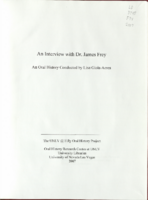
Transcript of interview with Dr. James Frey by Lisa Gioia-Acres, February 14, 2007
Date
Archival Collection
Description
Text
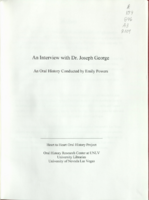
Transcript of interview with Dr. Joseph George Jr. by Emily Powers, April 8, 2008
Date
Archival Collection
Description
Text
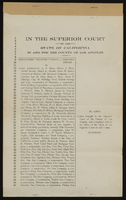
Superior Court of California summons
Date
Archival Collection
Description
Text

Transcript of interview with Gwen Walker by Claytee White, July 15, 2014
Date
Archival Collection
Description
Gwendolyn K. Walker arrived in North Las Vegas in 1962 from Houston, Texas, as a five-year-old with her parents, two brothers, and her cousins. The Walker family at first moved to a rented house on D Street, and Gwen attended Kit Carson Elementary School for first grade. Her mother enrolled in nursing school, so she sent Gwen back to Delhi, Louisiana, to be raised by her grandmother. In Delhi Gwen picked cotton with her aunt while she was in the second grade. Gwen returned to North Las Vegas to live with her mother and complete elementary school at Jo Mackey before matriculating to J. D. Smith Elementary School for junior high school and then to Clark High School. Later she attended UNLV. Gwen and her mother joined Saint James Catholic Church at H Street and Washington Avenue, but after she returned from Delhi she joined Second Baptist Church, where she became close with a cohort of friends that remained strong even as she experienced racism and bullying and love for the first time.
Text
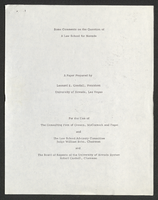
"Some comments on the question of a law school for Nevada" by Leonard E. Goodall
Date
Archival Collection
Description
Folder contains a paper titled "Some Comments on the Question of A Law School for Nevada" by Leonard E. Goodall, President, University of Nevada, Las Vegas for the use of the consulting firm of Cresap, McCormick and Paget, and the Law School Advisory Committee, Judge William Beko, Chairman, and the Board of Regents of the University of Nevada System, Robert Cashell, Chairman. From the University of Nevada, Las Vegas William S. Boyd School of Law Records (UA-00048).
Text
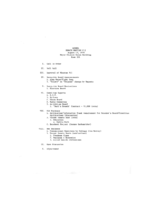
Meeting minutes for Consolidated Student Senate, University of Nevada, Las Vegas, August 15, 1978
Date
Archival Collection
Description
Text
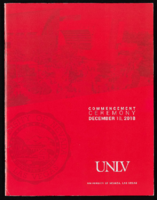
University of Nevada, Las Vegas (UNLV) Fall 2018 commencement program
Date
Archival Collection
Description
Commencement program from University of Nevada, Las Vegas Commencement Programs and Graduation Lists (UA-00115).
Text
